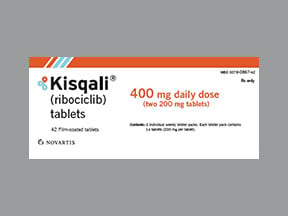
Kisqali (400 Mg Dose) Coupons & Savings Card – Discount Prices from $11310.15
My prescription
Edit
200MG, Kisqali (400 Mg Dose) (30 Tablet Therapy Packs)
Select pharmacy

Walmart
$11310.15
COUPON PRICE
Walgreens
$11321.14
COUPON PRICE
Albertsons
$11394.63
COUPON PRICEKisqali (400 Mg Dose) savings card
Show this card to your pharmacist
Walmart
$11310.15
BIN
ID
PCN
GRP
019876
LH28FF39D7
CHIPPO
LHX
Powered by
Price history for Kisqali (400 Mg Dose)
30 Tablet Therapy Packs, 200MG
Average retail price for Kisqali (400 Mg Dose)
Average SaveHealth price for Kisqali (400 Mg Dose)
Our price history data is based on aggregated prescription data collected from participating pharmacies in America. Our prescription data updates daily to reflect the latest price changes. If you notice a missing data point, it means there wasn't sufficient data available to generate a monetary value for that date.
*Retail prices are based on pharmacy claims data, and may not be accurate when we don't have enough claims.
Kisqali (400 Mg Dose) dosage forms
Dosage Quantity Price from Per unit 200MG 30 Tablet Therapy Packs $11310.15 $377.00 200MG 60 Tablet Therapy Packs $22639.29 $377.32 200MG 90 Tablet Therapy Packs $33968.43 $377.43
| Dosage | Quantity | Price from | Per unit |
|---|---|---|---|
| 200MG | 30 Tablet Therapy Packs | $11310.15 | $377.00 |
| 200MG | 60 Tablet Therapy Packs | $22639.29 | $377.32 |
| 200MG | 90 Tablet Therapy Packs | $33968.43 | $377.43 |
Kisqali (400 Mg Dose) Warnings
When considering the use of Kisqali at a 400 mg dose, it's important to be aware of several potential risks associated with its use:
Lung Inflammation (Interstitial Lung Disease/Pneumonitis): Kisqali has been linked to rare but serious lung inflammation, which can be life-threatening or even fatal. Symptoms to watch for include difficulty breathing, shortness of breath, and persistent cough. If you experience any of these, contact your healthcare provider immediately.
Severe Skin Reactions: In rare cases, Kisqali may cause severe skin reactions such as Stevens-Johnson syndrome or toxic epidermal necrolysis. Signs include a worsening rash, skin redness, blistering, or peeling, often accompanied by fever or flu-like symptoms. Seek medical attention promptly if these occur.
Heart Rhythm Changes (QT Interval Prolongation): Kisqali can affect the heart's electrical activity, leading to an irregular heartbeat. This may result in dizziness, fainting, or a rapid or irregular pulse. Regular heart monitoring is recommended during treatment.
Liver Problems (Hepatotoxicity): Elevated liver enzymes have been observed in patients taking Kisqali, indicating potential liver damage. Symptoms may include yellowing of the skin or eyes, dark urine, fatigue, or abdominal pain. Routine liver function tests are advised to monitor for this risk.
Low White Blood Cell Counts (Neutropenia): Kisqali can lead to a decrease in white blood cells, increasing the risk of infections. Signs of infection include fever, chills, or sore throat. Regular blood tests are necessary to monitor white blood cell levels during treatment.
Potential Harm to Unborn Babies (Embryo-Fetal Toxicity): Kisqali may cause harm to a developing fetus. Women of childbearing potential should use effective contraception during treatment and for at least three weeks after the last dose.
It's crucial to discuss these risks with your healthcare provider to ensure Kisqali is appropriate for your treatment plan.
Kisqali (400 Mg Dose) Side Effects
Kisqali (ribociclib) is a medication prescribed for certain types of breast cancer. When taken at a 400 mg daily dose, patients may experience various side effects, ranging from mild to severe. It's important to be aware of these potential reactions and to communicate any concerns with your healthcare provider. Common Side Effects:
- Blood Cell Count Changes: A decrease in white blood cells (neutropenia) is common, which can increase the risk of infections. Red blood cell counts may also drop, leading to anemia.
- Gastrointestinal Issues: Nausea, vomiting, diarrhea, and constipation are frequently reported.
- Fatigue: Many patients experience tiredness or weakness during treatment.
- Hair Thinning or Loss: Some individuals may notice hair thinning or loss.
- Headaches: Headaches can occur as a side effect.
- Skin Reactions: Rashes or itching may develop.
- Respiratory Symptoms: Cough or shortness of breath have been observed. Serious Side Effects:
- Lung Problems: Kisqali can cause severe inflammation of the lungs, leading to symptoms like difficulty breathing, persistent cough, or chest pain.
- Heart Rhythm Changes (QT Prolongation): This medication may affect heart rhythm, potentially causing a fast or irregular heartbeat, dizziness, or fainting.
- Liver Issues: Signs of liver problems include yellowing of the skin or eyes (jaundice), dark urine, fatigue, loss of appetite, or abdominal pain.
- Severe Skin Reactions: Serious skin conditions may manifest as severe rashes, blistering, or peeling skin, often accompanied by fever or flu-like symptoms.
- Low White Blood Cell Counts: A significant drop in white blood cells can lead to serious infections. Managing Side Effects: If you experience any side effects, it's crucial to inform your healthcare provider promptly. They may adjust your dosage, temporarily halt treatment, or discontinue it based on the severity of the side effects. Regular monitoring through blood tests and other assessments will help manage and mitigate potential risks associated with Kisqali. Always consult your doctor before making any changes to your treatment plan or if you have concerns about side effects.
Kisqali (400 Mg Dose) Interactions
When taking Kisqali (ribociclib) at a 400 mg dose, it's important to be aware of potential interactions with other substances:
Medications That May Increase Kisqali Levels:
- Strong CYP3A4 Inhibitors: These can raise Kisqali levels in your body, potentially leading to more side effects. Examples include certain antifungal medications like Ketoconazole and Itraconazole, some antibiotics such as Clarithromycin, and antiviral drugs like Ritonavir. If you need to take these medications, your doctor may adjust your Kisqali dose to 200 mg once daily.
Medications That May Decrease Kisqali Levels:
- Strong CYP3A4 Inducers: These can lower Kisqali levels, possibly reducing its effectiveness. Examples include Rifampin, Carbamazepine, Phenytoin, and herbal supplements like St. John's Wort. It's advisable to avoid these while on Kisqali.
Kisqali's Effect on Other Medications:
- CYP3A4 Substrates: Kisqali can increase the levels of medications processed by the CYP3A4 enzyme. This includes drugs like Midazolam, alfentanil, and certain immunosuppressants. Your doctor may need to adjust the doses of these medications to prevent side effects.
Medications That Prolong the QT Interval:
- Kisqali can affect heart rhythm, and combining it with other drugs that prolong the QT interval (such as certain heart medications like Amiodarone, or antibiotics like Moxifloxacin) may increase the risk of heart-related side effects. It's best to avoid such combinations.
Food Interactions:
- Grapefruit and Grapefruit Juice: These can increase Kisqali levels in your body. It's recommended to avoid them during your treatment.
Always inform your healthcare provider about all medications, supplements, and herbal products you're taking to ensure safe and effective use of Kisqali.
Using the SaveHealth discount card, what is the price of Kisqali (400 Mg Dose) without insurance?
Using the SaveHealth discount card, the price of Kisqali (400 Mg Dose) without insurance is $11310.15.
What is the price of Kisqali (400 Mg Dose) at Walgreens?
The price of Kisqali (400 Mg Dose) at Walgreens is $11321.14.
What is the price of Kisqali (400 Mg Dose) at Walmart?
The price of Kisqali (400 Mg Dose) at Walmart is $11310.15.
